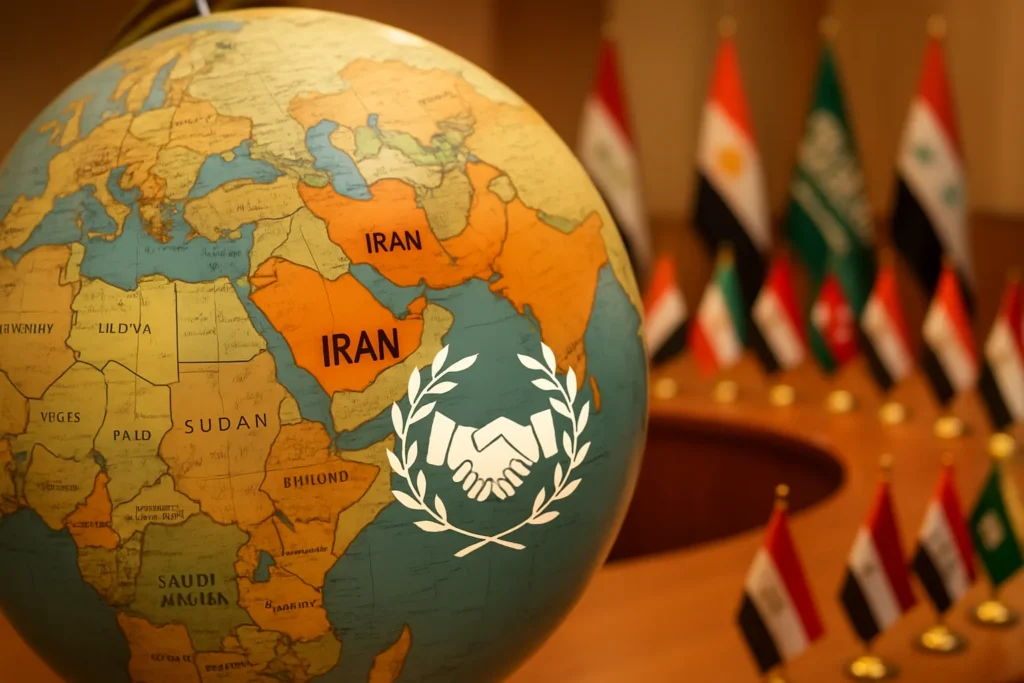Diplomacy at a Crossroads: Trump’s Qatari Overture
The world watched as President Donald Trump, a figure never known for diplomatic subtlety, delivered a pointed plea in Doha: Qatar should leverage its unique ties to Iran to help broker a new agreement limiting Tehran’s rapidly advancing nuclear program. At a gilded state dinner beside Emir Sheikh Tamim bin Hamad Al Thani, Trump warned ominously of only two paths forward—one peaceful, one perilous. His remarks, made mere days before a fresh round of nuclear talks in Istanbul, signaled both hope for diplomacy and the ever-present risk of military escalation.
A closer look reveals this high-stakes moment is not a simple binary. The complex tapestry of Middle Eastern politics offers no easy answers. As historian Trita Parsi of the Quincy Institute notes, “When external powers try to force quick solutions on old regional rivalries, the outcomes are as unpredictable as they are often dangerous.”
Trump’s overture is layered with contradiction. The man who unilaterally withdrew the United States from the 2015 Iran nuclear deal now demands urgent action—warning Tehran, yet again, to abandon uranium enrichment or face dire consequences. Since the U.S. abrogated that deal in 2018, Iran began enriching uranium up to 60%, a hair’s breadth from weapons-grade. According to the International Atomic Energy Agency, Iran now holds enough fissile material to build several bombs if it pursues that path.
Qatar’s Role: Broker or Bystander?
Why Qatar? Few nations walk the fine line between Washington and Tehran better than the tiny Gulf kingdom. With deep economic ties to Iran—including the shared world’s largest natural gas field—and a willingness to host regional dialogues, Qatar has cultivated a reputation as an indispensable go-between. During the state dinner, Trump alluded to this, saying, “Your prime minister, your great leader…what you’re doing for them is a big favor.” That “favor,” it seems, is serving as an informal shuttle between adversaries whose distrust runs bone-deep.
Qatar’s diplomatic balancing act is nothing new. It has long positioned itself as a neutral ground for back-channel negotiations, including recent mediation efforts with Hamas amid the Israel-Gaza conflict. “Qatar is one of the few countries talking to everyone,” insists Dr. Sanam Vakil, deputy director of Chatham House’s MENA program. “That makes it valuable, but it also means its influence is inherently limited.”
The Emir himself struck a cautious but principled note: yes to non-proliferation, yes to dialogue, but also yes to Iran’s right to peaceful nuclear energy—a stance consistent with both international law and regional realpolitik. As he said, “The issue needs a diplomatic solution. Iran has a right to civilian nuclear power so long as it poses no threat.” The world has seen, time and again, that denying basic national rights breeds only resentment and instability, not the security hawks in Washington promise.
“If America truly wants stability in the region, it must learn that lasting peace cannot be imposed at the barrel of a gun, nor brokered through one-sided ultimatums.”
Appealing to Qatar is not, by itself, a coherent strategy. The real question lingers: does the White House seek genuine diplomacy or merely a scapegoat when talks fail?
Consequences of Breakdown: History—And Hawks—Loom Large
Peeling back the layers, one finds that Trump’s rhetoric reveals as much about American political dysfunction as it does about the Middle East. The hardline, pressure-first approach favored by many conservatives reflects a deep faith in coercion, but precious little understanding of the region’s social and historical currents. According to a recent Pew Research study, the majority of Americans want a diplomatic solution to Iran’s nuclear ambitions—not another war. Yet right-wing leaders too often ignore such realities, clinging to confrontational tactics that have repeatedly failed, from Iraq to Libya to Afghanistan.
Haunting memory flashes back to 2003, when American leaders—guided by “either with us or against us” thinking—marched the nation into a disastrous Iraq war over nonexistent weapons of mass destruction. Are we truly prepared to repeat those mistakes? As Harvard’s Dr. Matthew Bunn, nuclear policy expert, emphasizes, “Ratcheting up threats rarely produces meaningful concessions. Constructive engagement and robust verification can achieve what saber-rattling cannot.”
What, then, is at stake in these negotiations? The math is stark: Iran enriches uranium to 60%, and the clock is ticking as it amasses enough to break out should it decide. The uncertainty this generates destabilizes not just the region but the global economy, with oil markets reacting to every diplomatic lurch or missile fired. Yet burying diplomacy under maximalist demands ignores the lesson of the 2015 deal, which did more to slow Iran’s nuclear advances—at least while it lasted—than any military threat or sanctions regime.
Critics of Trump’s approach point to the collapse of trust following his withdrawal from the original nuclear agreement. The result? Tehran is more isolated but also more determined to pursue a deterrent. Regional allies, from Israel to Saudi Arabia, grow restive, while ordinary Iranians face crushing sanctions that have devastated daily life. “Walking away from a multilateral agreement and expecting others to clean up the mess isn’t leadership,” Dr. Parsi asserts. “It’s abdication.”
Rarely does history offer second chances. As the next round of talks convenes in Istanbul, the world must decide whether it will hold fast to failed paradigms or embrace real, inclusive diplomacy. True security in the region—and by extension, the world—demands more than binary threats and transactional politics. It asks for vision, patience, and the humility to recognize that enduring peace is not won by dominance but by engagement, compromise, and a willingness to listen to all voices at the table—including those we mistrust.

